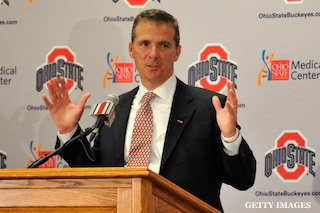
Two years ago, when Urban Meyer decided to leave his cushy job in the TV booth for the cauldron of college coaching that is Columbus, Ohio, he did so with a very clear goal:
Perfection, on every front.
That's "clear," not easy.
From the day Meyer returned to Columbus, where he had once been a graduate assistant, he sought to win every game, just as he had tried to do at Bowling Green, Utah and Florida. But this time he also intended to maintain his family life, his health and his sanity, all while trying to give the Ohio State football program the imprimatur of integrity -- something it hadn't enjoyed under his predecessor, Jim Tressel.
Winning every game is a hell of a goal, of course. But if you had to bet four months ago which one of those three goals Meyer was mostly likely to achieve -- a national title, a healthy lifestyle or a reputation for doing the right thing -- you'd probably pick Meyer to run the table first. After Michigan State upset Ohio State, 34-24, in the Big Ten title game, snapping its 24-game winning streak, the Buckeyes will be without a Big Ten title again for the fourth straight year (having vacated its share of the 2010 title due to NCAA sanctions) and a national title is off the table. But in the process of failing to achieve his most public goal, Meyer might have taken a big step toward achieving a more important one.
In the early-morning hours of Dec. 6, 2009, just a few hours after his undefeated Florida Gators lost the Southeastern Conference title game to eventual national champion Alabama, head coach Urban Meyer woke up, grabbed his chest, and collapsed.
His wife, Shelley, who'd been concerned about his health since he took the Florida job in 2005, didn't need to be convinced to call 911. An ambulance rushed to take Meyer to the hospital. Doctors determined it wasn't a heart attack he'd suffered, but they still couldn't pinpoint the problem.
The day after Christmas that year, Meyer announced he had "ignored my health for years" and would retire as Florida's coach after its Sugar Bowl game against his alma mater, Cincinnati.
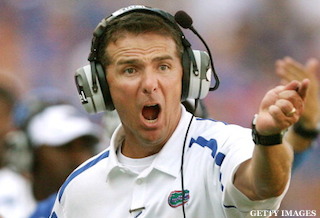
The Ohio native ultimately decided to take a leave of absence for a few months, before returning to lead the Gators the next season to a disappointing 8-5 record. After Florida beat Penn State, 37–24, in the Jan. 1, 2011, Outback Bowl, Meyer again announced his retirement, citing the same reasons he had the year before.
Thus, at the height of his powers, Urban Meyer did what few men in his profession would even consider: He left the game for the TV booth, where he spent the 2011 season critiquing other teams.
The same fall Meyer spent emerging from his living hell, the Ohio State Buckeyes spent entering theirs, including firing Tressel, the first OSU coach since Woody Hayes to win a national title, and submitting to NCAA sanctions for "Tat-gate."
All this set up OSU's 38-year-old interim coach, Luke Fickell, and the Buckeyes for a historically horrible 2011 season. Ohio State struggled through a 6-7 campaign, including close losses to Michigan State, Penn State and Michigan -- its first since 2003 -- and a final humiliation at the hands of the 6-6 Florida Gators in the TaxSlayer.com Gator Bowl. The 2011 Buckeyes suffered the school’s first losing season in 23 years, and only its second since 1966.
Near the end of the 2011 season, Ohio State had to make the most important hire most athletic departments have to make.
Ohio State's next head coach would be under immense pressure to win. To many Buckeye fans, Tressel's worst transgression was not getting the team put on probation, but getting blown out twice in national title games.
But could the Buckeyes' next coach also help the program's "image problem"?
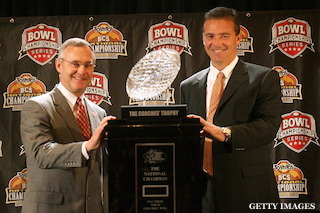
Unlike NFL franchises, which simply hire the most talented coach available, schools like Michigan, Penn State and Ohio State need to find a head coach who can not only win games, but also win over the lettermen, the loyal alums, and the fans. He needs to represent the entire school and even come to embody it.
Why Ohio State wanted Urban Meyer is obvious: After the prodigal son reached the apex of his profession, the Buckeye backers longed for him to return to his native land. But why would Meyer, a multi-millionaire who had already won two national titles, want to leave a comfortable job at ESPN to return to one of the biggest pressure cookers in coaching?
During Meyer's happy hiatus, he made his first visit to his family doctor in years. The generalist determined in five minutes what the specialists couldn’t diagnose after years of tests: Meyer’s problem was not a heart condition, but merely esophageal spasms and acid reflux, which was resolved with a dose of Nexium, literally overnight. "The next morning,” Meyer told me, “I felt like a new man. And it got better."
But the catch was a familiar one to college coaches: Both conditions were aggravated by stress, which the job provides by the bucket.
So why would he jeopardize his renewed health, his revitalized family life, and his rediscovered sanity to return to the sidelines -- especially when it would include moving from Florida to Ohio, a trip most retirees make in the other direction?
No doubt additional money and fame have their appeal, but Meyer already had ample doses of both. More likely, having removed his biggest obstacle to coaching, he wanted to get back at it. For competitive personalities, there is naturally no substitute for actual competition. That it was the Ohio State Buckeyes coming after him tipped the scales.
After Ohio State hired Meyer on Nov. 28, 2011, between its loss to Michigan and its loss to Florida in the Gator Bowl, Meyer didn't waste any time putting his stamp on the program. When Meyer walked into his first team meeting that day, he did not start with the usual pleasantries -- hello, thanks, great to be here. He told them all to sit up straight in their seats, then pointed out those who weren't sitting straight enough.
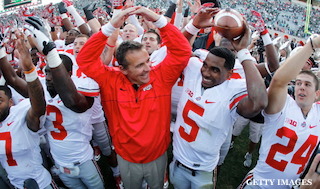
"He grabs your attention right away," 2012 captain Zach Boren told me, in an interview for my book, Fourth and Long: The Fight for the Soul of College Football. "That first meeting was intense. Intense. But that's something we needed. We'd gotten complacent around here. He was all serious, all business."
If you wanted to go get a beer, Meyer might be among the last coaches you'd pick -- on a short list with such grim reapers as Nick Saban and Mark Dantonio. All big-time coaches have deeply competitive personalities, of course, but Meyer is wired just a little tighter than most. But he did not come to Columbus to have a beer with you. He came to run the table -- and his yearlong campaign started that day.
As if Meyer didn't have enough on his plate, he wanted to accomplish something else, too: Fulfill the "contract with his family" they wrote up when he accepted the job, and wipe clean the stain on Ohio State's reputation, through more diplomas and fewer arrests and sanctions. He had returned to Ohio State to produce that familiar oxymoron, a professionally run program of amateur excellence.
"The stakes are extremely high," he told me before his first season in Columbus. "It's Ohio State. Do you build up to next year? No, we simply try to win every game we play, every year. It's Ohio State. There will never be a time at Ohio State that we're worried about next year. We always want to win now. So, from where I sit, the stakes couldn't be higher. And you can print that."
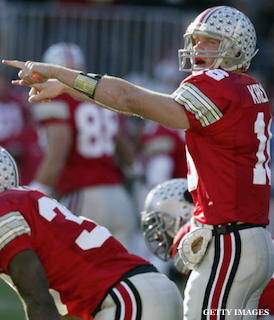
Of course, that wasn’t exactly a state secret.
Craig Krenzel is one of the few native Michiganders who chose to play for Ohio State, and he did so in memorable style, quarterbacking the Buckeyes to their first win in Ann Arbor in 14 years, breaking a streak that dated back to Earle Bruce's last game in 1987. Then he led Ohio State to the 2002 national title, its first since Woody Hayes' 1968 team. Along the way, Krenzel earned a 3.75 GPA in molecular genetics. He decided to leave the pre-med path for business and now provides commentary for 97.1 The Fan in Columbus.
"Is coaching Ohio State the biggest pressure cooker in the country?” Krenzel asked. "It's up there. But that all depends on how you perceive pressure, and where it comes from.
“When you play at Ohio State, the fans don't expect more from you than you do. Those are the kinds of players this place attracts, and if you don't have that mentality, you don't last very long here. If you have that mentality, it's a pressure-packed situation, no doubt, but it’s pressure packed because you're a perfectionist.
"What I just described is exactly how Urban Meyer is wired. He is as intense as it gets. I look at how he coaches, his expectations, his transparency, and I think it's a breath of fresh air in this age. Recruits are usually sugarcoated and schmoozed, but he just says, 'You'll earn everything you get. I’ll make you a better football player -- but you're gonna earn it.'
"Nobody expects more out of him than he does. The man is a perfectionist."
After proving it during his introduction to the players, Meyer proved it again with his coaches, before their first spring.

Meyer believed he would be a wiser coach, thanks to the year he had just spent analyzing games in ESPN TV's booth.
"I learned what all great programs have in common," he said. "It doesn’t matter if they're running the spread, the wishbone, or a pro set, or if they run a three-four defense, or what league they’re in. No, it’s the alignment of the staff. If everyone's on the same page -- if the CEO says this is how it's done, and nine coaches believe it -- you have a shot. If you're not -- if even one position group is off -- you don't, and you’re done.
"That means, when I ask [an assistant] for a quick answer, give me a quick answer. Don't give me another question. And when I say something, I want it done.
"I need that responsiveness." Without being prompted, he added, "I don't have that yet."
To get that, before 2012 spring practice even started, Meyer and his new assistants were running through practices -- without players. "We practiced practice," he said, taking his already manic levels of preparation to new levels.
The tug-of-war between success and sanity had commenced.
The 2012 Buckeyes had a few scrapes along the way, but no one -- not even the Wolverines -- stopped them from achieving their stated goal: Win every game. Meyer achieved his second goal, by maintaining his health, his sanity, and a normal family life, even finding time to see his college volleyball-playing daughters compete during football season.
The third goal, it turned out, would be the toughest. After the first quarter of the Michigan game, at the Horseshoe, Ohio State honored its 2002 national-champion team on its tenth anniversary. Their coach, Jim Tressel, had cost the 2012 undefeated team not just an invitation to the Big Ten championship and to a BCS bowl game, but a shot at a national title.

None of that stopped the 2002 players from hoisting Tressel onto their shoulders and marching him around the Horseshoe, to the cheers of the 105,899 fans in attendance that day -- one more dent in Ohio State's reputation.
The Buckeyes' recent past, and the comments from their president to their fans, suggest their priorities are not the same as Northwestern's -- or Michigan's. Putting aside former President Gordon Gee's unfortunate comment (“I’m just hopeful [Tressel] doesn’t dismiss me!") and Maurice Clarett's steady stream of damaging quotes (“I was living the NFL life in college," he said. “I got paid more in college than I do now” in the United Football League) the hits still kept coming. Early in the Buckeyes' 2012 season, their third-string quarterback Cardale Jones tweeted a PR man's nightmare:
You could argue that anyone whose grammar and punctuation were that bad and was not even a starter is exactly the kind of person who should take most advantage of the educational opportunities being offered, but that's a side point.
The Buckeyes do not run a renegade program, but they once again demonstrated they don't seem to care if their actions make others think they do.
And that's where Meyer picked up this summer: Needing to restore Ohio State's reputation, and his own. After former Florida Gator Aaron Hernandez was arrested and charged with murder, it came to light that 31 Florida Gators had been arrested for various offenses during Meyer’s six years in Gainesville. Granted, many of the charges were typical of college students -- underage drinking and the like -- but enough were serious charges, like burglary, stalking and domestic violence, that Meyer had some explaining to do.
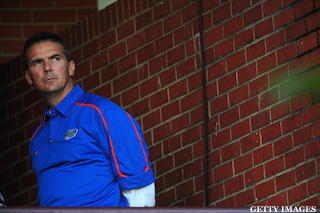
This offseason didn't make Meyer's life any easier, when four Ohio State players were arrested for things like making contact with a bar employee, minor in possession of alcohol and a fake ID. Meyer, who knew both he and his program were being scrutinized, meted out relatively stiff penalties.
(He was smart enough not to attempt to hide behind his Florida team's academic success, with all six of his Gator teams finishing in the top three in the SEC in both Academic Progress Rate (APR) and graduation rates, often trailing only Vanderbilt, and every senior on his 2008 national title team graduated, there was no reason to doubt he was serious about academics. Further, Ohio State graduated 74 percent of their players that spring -- up from 63 percent just two years earlier -- ahead of Michigan and every other Big Ten school except Northwestern and Penn State. Meyer must have calculated it was not a summer for defenses -- and wisely so.)
But the attention-getter was his star tailback, Carlos Hyde, who was being investigated by police for slapping a woman in a Columbus bar. The woman soon decided not to press charges, but Meyer gave Hyde a three-game suspension, just the same. Most critics felt Meyer had struck upon the firm side of fair, a sentence that would probably meet or exceed that of most coaches.
But Meyer’s most public test, perhaps, occurred after the Michigan game, a nail-biter the Buckeyes won, 42-41. The victory extended Ohio State's winning streak to 24, and marked Meyer's second season in Columbus with his family and sanity intact. But the aftermath of an on-field fight threatened his third objective.

After Marcus Hall was ejected from the game in the second quarter, the right guard decided to salute the Big House crowd with double-barreled middle fingers. The Big Ten, after a careful investigation, somehow concluded that Hall's actions didn't violate "Conference Agreement 10.01,” which states in part that "the conference expects all contests involving a member institution to be conducted without compromise to any fundamental element of sportsmanship (including) integrity of the competition, civility toward all, and respect, particularly toward opponents and officials."
The conference let Hall off with a reprimand -- which is probably not what a field hockey player would have received for a similar act -- then Meyer confirmed that Hall would not be suspended for the upcoming Big Ten title game against Michigan State.
No doubt, with his dream of a national title just two wins away, the temptation had to be overwhelming, especially after the conference gave the green light. For this, many columnists crushed Meyer, and not without reason. By the end of the week, Meyer started saying that Hall would sit out the first series, but he wouldn't commit to more than that. This earned him more scorn, for the vagueness of his decision.
When he had the chance to separate his program from Tressel's, he let it fly by like a hanging curveball down the middle.
Then Meyer surprised the crowd by keeping Hall on the sidelines for the entire Big Ten title game -- even as the Buckeyes fell behind, and failed to come back.
This makes you wonder why he didn’t simply bring the hammer down from the start, and get credit for doing the right thing all week long -- instead of taking the hammer himself.
As Michigan's legendary athletic director, Don Canham often said, “Never turn a one-day story into a two-day story.” Here, Meyer turned it into a one week story.
But his sin now is not low ethical standards, but poor public relations -- a very different shortcoming.
Given Meyer's track record everywhere he’s coached, coupled with Ohio State's winning tradition, you'd be foolish to bet against his teams competing for national titles in the years ahead.
But even if he wins a title or two, this could be the moment they will still be talking about: When Meyer stepped out of Jim Tressel's shadow, and started turning reputations around.
-- JOHN U. BACON is the author, most recently, of Fourth and Long: The Fight for the Soul of College Football, a New York Times bestseller. He gives weekly commentary on Michigan Radio, teaches at the University of Michigan and Northwestern's Medill School of Journalism, and speaks nationwide on leadership and diversity. Learn more at JohnUBacon.com.




